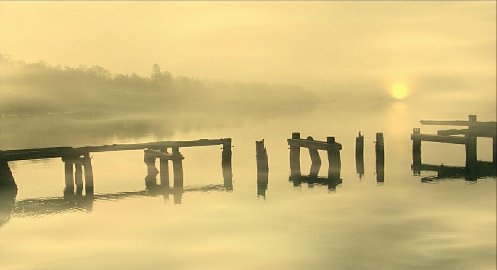
Images Of Ireland
Beautiful, dark, mysterious Donegal (Dún na Gall)
There must be more songs written about Donegal than any other place on earth. Donegal contains the most northerly part of Ireland (Malin Head) but is in "The South of Ireland" It has wild mountains and a rugged coastline which looks west towards the raging Atlantic. It is probably Irelands most beautiful county. The beaches are spectacular and you can usually have one all to yourself.

Tranquility
by Owen Brennan
Drive north from Derry just past
Inch island towards Buncrana and you could well miss this wee piece of heaven.
It's the old Fahan Pier and it's hidden from the road. There's a 7th Century
stone pillar in the nearby graveyard. They are building a new marina close by
and I hope it doesn't spoil things.
(When I read Roisin's poem
"Sunrise" I thought of this photo and decided to put them together.
Roisin from Kilkeel, Co. Down was ten when she wrote it. I appreciate you
sending it in Roisin, you can paint pictures with your words: Owen)
Sunrise
Softly the waves will ripple,
Gently the seabirds crow,
Quietly the sailor rows,
In the morning glow.
The sun will soon be rising,
For night has faded away,
So say good bye to morning,
And say hello to day.
This is a simple morning,
When the sun just seems to smile,
But also a piece of beauty,
From the Emerald Isle.
Copyright © 1997
Roisin Murphy
|
This was taken on a scenic route near Dunkineely |
Spectacular and Donegal's highest mountain Errigal is 2,466 feet |
Just two of five beautiful
photos Chris aged 19 from Norfolk, England sent me. Chris hopes to move to
Ireland in the near future. He's a big fan of Shay Given who plays for Newcastle
United and the Republic of Ireland.
Chris has created a Shay website at http://www.shaygiven.co.uk
You can contact Chris at shaygiven@btinternet.com
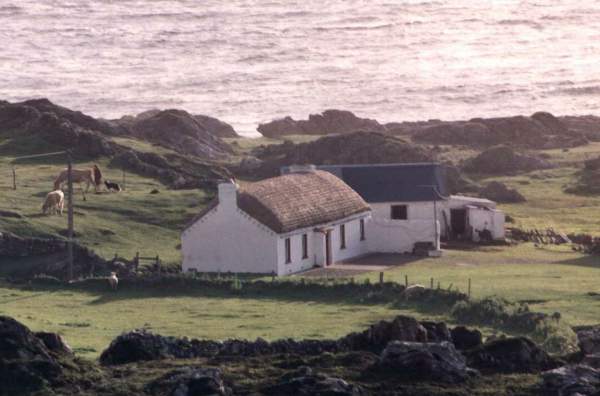
Thatched Cottage by
Dave Schofield
This photo was taken on one of my favorite drives in Ireland. I was up on top of
a hill just south of Malin Head when around a sharp turn (and there are many on
this road!) I could see
the sun just beginning to set and this peaceful pastoral setting well below me.
A traditional thatched farm cottage on a farm directly on the water. The stone
walls give testement to the hard work it must have been to clear the land
for the small farm. If you look closely
in the photo you can see a woman walking out to tend the cattle. (David Scofield)
Thanks David for
capturing so beautifully this glimpse of a lifestyle which is fading fast as the
"Celtic Tiger" takes Ireland towards a wealthier but faster future.
David is a a professional sports photographer in the US and you can contact him
at ducky022@optonline.net
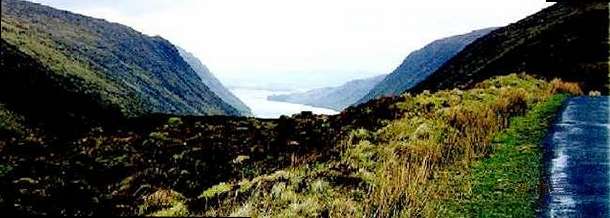
"Glenveagh National Park" by Pamela Dunn
Beautiful Glenveagh National Park is an area
of about 10,000 acres. It has it all.
Wild mountainside, a lough, a castle, formal Italian and French gardens,
600 red dear and it's open to the public.
"
"Hill Farmer" by Owen Brennan
Farmer returning home from the
hillside after working at his turf.
Turf was the main source of cooking and heating fuel in Ireland. It is peat cut out of the
ground into pieces about 12 inches x 4 x 4 and allowed to dry. There is a closer photo of
the farmer and his turf-stack in the People of Ireland section.
It Picture taken on the Innishowen Peninsula near Slieve Snaght.
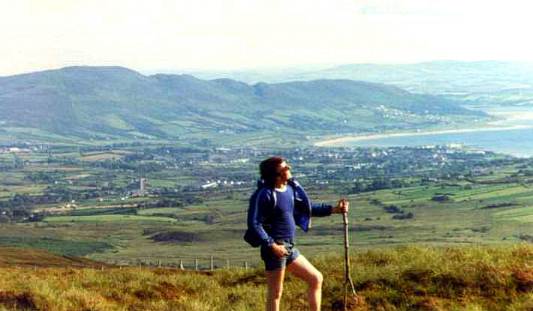
"Brennan on The Moor" by Gail Brennan
Taken some time ago of me walking in the
Donegal hills. Fahan Strand
and the popular seaside town of Buncrana can be see in the distance.
The song "Brennan on the Moor" is
about Willie an Irish Robin Hood in the 1700's.
I'd be proud to have him as an ancestor.
![]()
|
Killybegs
is one of Irelands main fishing ports. You will find many big ships entering the
harbor,
each with its own entourage of calling seagulls. These photos were taken by Billy and Christine my cousin, I believe that's her with the black labrador. |
Killybegs has a large church, Saint Catherine's which was built in the mid 1800's. The town has also recently become famous for its oatcakes :0) To the south of Killybegs, Drumanoo head has a fine view and walks. To the west the mighty Slieve League cliffs plunge down to a dark blue Atlantic. |
|
The Killybegs Experience by Sara McClintick
I’ve discovered that many Irish people aren’t sure where Killybegs is, except that most know there’s a song about the place. A native once told me that you go to Donegal town and turn left and keep on driving until you nearly drive into the sea, and then stop: that’s Killybegs. It was with a Trafalgar Tour that I first rolled slowly into this tiny village suspended between sea and sky. Our extraordinarily tactful Tour Director has mentioned that the aroma from the fish processing plant might be memorable-to-overwhelming, but just to pray that the wind would be blowing the right way. As it so happened, it wasn’t the cannery smell but rather the people of Killybegs who completely overwhelmed me with their friendliness and kindness.
While everyone else on the tour poured into the local hotel for lunch, I bought a quick pack of oatcakes, and munched them as I rambled up and down the hilly streets, talking to anyone who seemed friendly. When a fast, hard rain sprang up, I took shelter in the deep little doorway-alcove of a shop. And soon afterward, a thin, elderly man popped into my shelter. He wore a old, old navy suit with the lapel pulled up around his neck, and one of those lovely soft, sheltering caps that so many Irish men wear. At his side, he held a lighted cigarette in the ingenious curve of his left hand, to shelter it from the drenching rain. I marvelled at how the Irish have learned to do a great many things in the rain, including smoking. He stood and peered out at the downpour for several moments before he saw me in the shadow of the shelter, and it startled him a bit, as he turned toward me.
"Won’t last long, American miss," he promised cheerily. I loved that he could tell at a glance, even in the shadowy light, that I was a foreigner, and that he wanted to offer some sort of reassurance on this unpredictable Irish weather. But I love the rain, in all forms, so Ireland feels quite a homey place to me. And sure enough, the rain abruptly passed out to sea, and the sun came out in all its November radiance. I parted enriched from my jolly companion-weatherman of the shelter.
Climbing to the highest spot in town, I found the Catholic Church, and was mesmerized by the large fragment of a Celtic cross displayed in the front courtyard. How old it must have been. How many lives had it comforted or dismayed over the years, I wondered. So I nibbled my small sack of oatcakes and studied the weathered markings on the cross. Out of nowhere came a discouraged looking stooped man, dressed like a priest. He looked absently at me, and at the cross, and paused. So, not wanting to be inhospitable, I held out the bag and said, "Would you like to share my oatcake lunch?" He too was startled, like the weather man, and paused in some mild kind of distress, but hesitating to walk on. He asked if I was a visitor, and I said just over from America. And then to my utter surprise, he poured out a sad little account of being in Killybegs for a fortnight with his nephew to recover from a very bad and stressful time in his life. I was too surprised to ask for details, and he seemed too distracted to offer any, but he seemed to gain peace from his rambling, vague little recitation. He’d just been down in the town for his tea, he offered as explanation for declining my oatcakes.
"I was not meaning to be burdening you with all my troubles," he ventured. "But it was your offering of the oatcakes that seemed to loosen my tongue." He paused, and smiled ever so slightly, and shuffled off to the darkened church doorway, with one shy little, backward lifting of his hand.
Heading back to our coach, I tried to memorize the precious details of this isolated little community of souls and oatcakes on the edge of the sea. The gulls lining the peaks of the steep roofs. The faded colors of the shop fronts. The very faint aroma of the fish processing plant. The utterly open faces and gentle hearts of the people who live here everyday, who no doubt eat the oatcakes without noticing how delicious they are, and who probably never even smell the cannery scents wafting over the town at times.
Back in America I actually wrote to the baker’s address on the oatcake package, and humbly pleaded for their recipe, even going so far as to offer myself as an baker’s apprentice and floor-sweeper, should they ever want to be hiring one. I got no reply, but decided to experiment and re-create those oatcakes myself. After all, there couldn’t be too many exotic ingredients in them; surely it was just a matter of getting the proportions right. Probably 25 attempts later, I have re-captured Killybegs in my kitchen. I can bake in my own Pennsylvania oven the taste of those oatcakes, the taste of that fishing village. And when I eat them, with scalding hot tea on a misty mild day, if I close my eyes a bit, I can feel myself again in Killybegs, hearing the sounds of those voices that I love so well. I do not know their names, but culinarily, I am connected to them. And comforted.
Owen: If you and your wife are ever passing near Pittsburgh, let us know. My husband and I would welcome you to our tiny village of Mars, Pennsylvania.
(Thanks Sara for the beautifully detailed story. You took me with you, back to your day in Donegal and I loved it, I didn't mind the rain one wee bit either. Already I've asked my wife Gail to make the oatcakes for me. But if they don't turn out too good I'll just have to got to Mars, Pittsburgh to try yours)
![]()
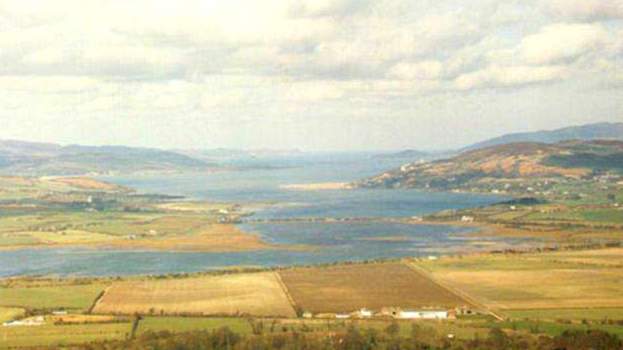
"Heaven & Earth" by Owen Brennan
Photograph taken from the
spectacular man-made Grianán of Aileach which was built B.C.
We are looking northwest towards Lough Swilly also known as "The Lake of
Shadows"
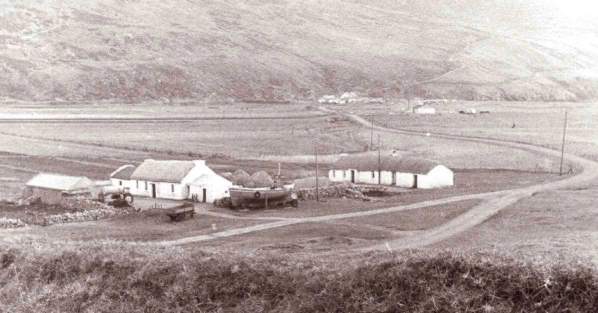
"Bygone Days" by Owen Brennan
Traditional Irish thatched cottages situated on the west side of the "Gap of Mamore" in the Innishowen peninsula. There is a fine 100 mile drive around the circumference of Innishowen which makes for a really good day out.
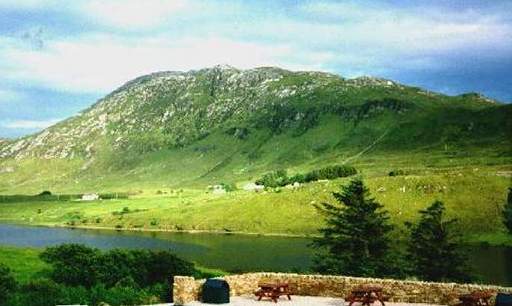
"Fintown Area" by Sally Boyle Weigand
Fintown is a small town in Donegal on the River
Fin. Sally's grandmother, Anna McGeehan, lived there until she was 13 then emigrated to
Philadelphia where she lived until her death. As far as it's known the remainder of her
family stayed in Ireland. Sally's grandfather, Charles
Boyle, was from a small village near Fintown called Doochary. Half of his siblings
remained in Ireland. He and Anna both came to the US on the same ship but did not meet
until they were living in Philadelphia. They married in 1901.
If you'd like to contact Sally you can reach her at s-weigand@excite.com
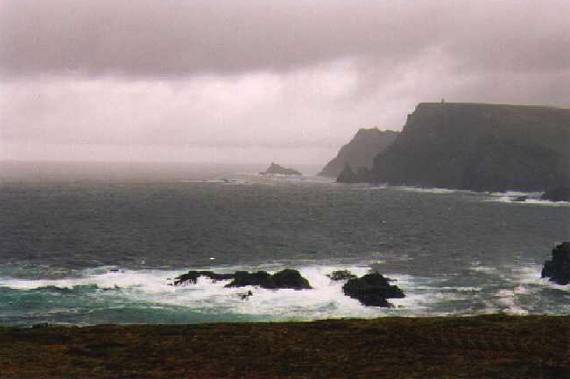
"Coast of Co. Donegal (far NW)" taken by Pamela Dunn
Even when the sun isn't shining Ireland is spectacular and mystical. This photo was taken in the Glencolumbkille area, possibly Glen Bay.
Front Page . Photo's . Music,Songs & Singers . Poetry & Stories . Recipe's
Message Board . Links . Contact me & Letters
Owen Brennan
Copyright © 1998 belongs with the original authors. All rights reserved.
Revised: February 01, 2004.